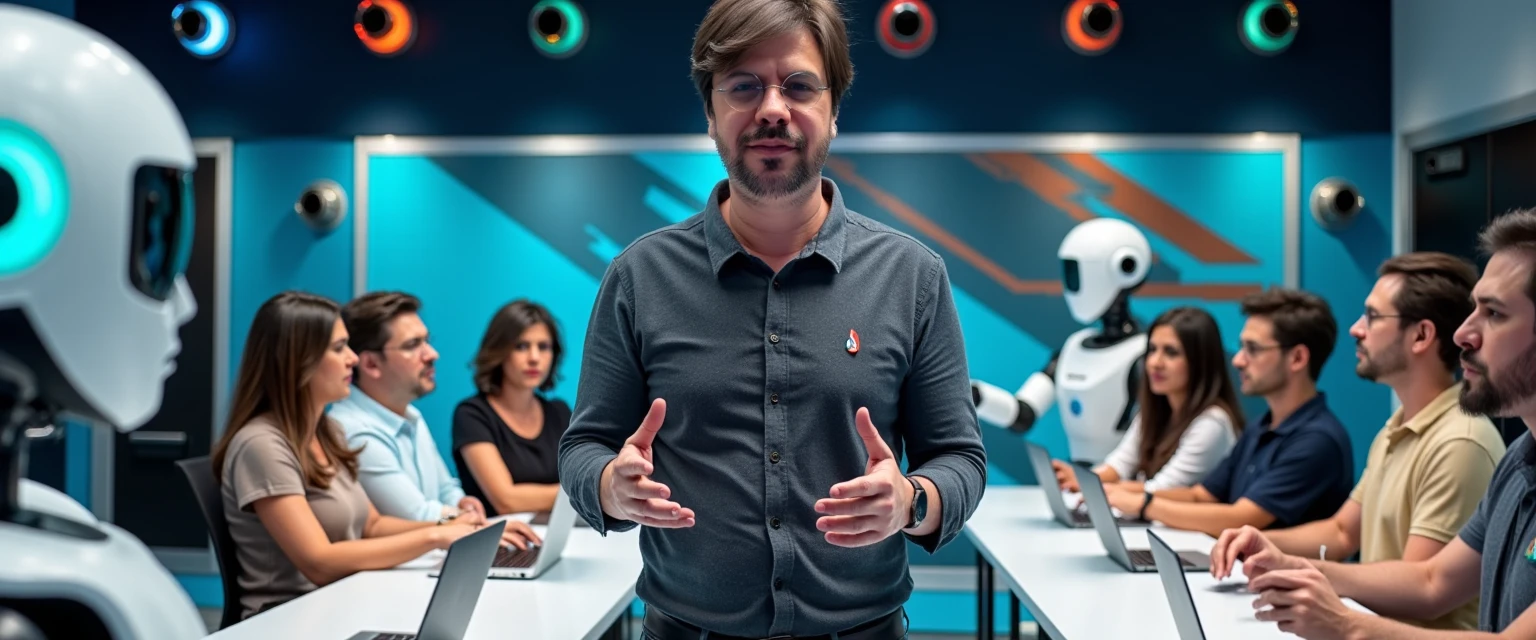AI Radar: Goiás Leads National Regulation While Meta and Trump Advance into New Frontiers
May 17, 2025 | by Matos AI

Brazil Begins AI Regulation: Goiás Takes the Lead
The AI scenario in Brazil reached an important milestone in the last 24 hours: Goiás became the first Brazilian state to approve specific legislation to regulate the use of artificial intelligence. The Legislative Assembly unanimously approved the project that creates the State Policy for Promoting Innovation in Artificial Intelligence, now only awaiting the sanction of Governor Ronaldo Caiado.
The Goiás project could not be more timely. While we are witnessing the rapid development of AI globally, we have seen a growing but still disorganized adoption of this technology in Brazil. The Goiás initiative brings very interesting elements, such as the inclusion of AI subjects in the state school curriculum and partnerships with Sistema S to train specialized professionals, in addition to the creation of a State Center for Open Computing and AI in Goiânia.
In my conversations with government officials and innovation ecosystem leaders, I have repeatedly highlighted the need for a structured approach to AI adoption. More than simply implementing technology, we need to prepare people and create environments that are conducive to the responsible development of these solutions.
Join my WhatsApp groups! Daily updates with the most relevant news in the AI world and a vibrant community!
- AI for Business: focused on business and strategy.
- AI Builders: with a more technical and hands-on approach.
It is worth remembering that a more comprehensive bill is also being processed in the National Congress to regulate the use and development of AI throughout Brazil, covering topics such as standards for use in public institutions and issues related to copyright. The initiative in Goiás could serve as an important pilot case to inform national legislation.
The Danger of AI “Hallucinations” in the Justice System
A recent case at the Supreme Federal Court reveals the challenges that generative AI poses to the Brazilian judicial system. Justice Cristiano Zanin denied the right to proceed with a constitutional complaint whose petition was drafted with the help of artificial intelligence. The document contained serious flaws, including references to non-existent judgments and incorrect attributions to binding precedents.
Second report from Migalhas, Zanin characterized the case as procedural bad faith, as there was a deliberate attempt to distort the legal context of the action. The petition even contained a watermark “Created with MobiOffice” on all pages.
This case perfectly illustrates what I have been warning about in my lectures on AI: technology is a powerful tool, but its misuse can have serious consequences. So-called AI “hallucinations” – when systems generate false information but present it as true – are particularly problematic in contexts such as the legal field, where factual accuracy is essential.
In my mentoring work with legal tech startups and companies, I always emphasize the need for robust verification systems when implementing AI in sensitive workflows. It’s not enough to simply adopt the technology; you need to ensure proper processes and human oversight.
Meta Bets Big on Social AI, But Faces Delays
Meta continues its AI offensive with the launch of the Meta AI app, which combines content generators with social tools. According to UOL report, the app allows users to share their creations, encouraging the use of AI as a new form of social interaction.
Mark Zuckerberg has been clear that AI must play a central role in every aspect of the company, from advertising to personal interaction through chatbots. This approach represents a natural evolution of Meta’s original mission of connecting people, now powered by AI agents.
At the same time, Estadão reports that the company delayed the launch of its “super AI” due to concerns about finalizing technological features that are not yet ready to be presented to the public.
This delay is significant and highlights a pattern I’ve observed in the AI market: the tension between time-to-market and the need to ensure safety and quality. Companies are under intense competitive pressure to launch increasingly advanced AI capabilities, but the risks associated with a premature launch can be substantial.
In my work with technology startups, I’ve seen that the companies that best navigate this dilemma are those that can establish agile development processes while maintaining rigorous testing and validation standards. In my mentoring, I help startups find this critical balance between speed and accountability.
The Geopolitics of AI: Trump and the Deals with the United Arab Emirates
On the international scene, an important move: US President Donald Trump announced during a trip to the Gulf that the United Arab Emirates will be able to purchase advanced semiconductors for artificial intelligence from US companies. According to Terra report, this is a significant step in Abu Dhabi’s efforts to become a global AI hub.
Furthermore, the trip resulted in a promise from the UAE capital to increase the value of its energy investments in the US to US$1.4 billion over the next decade. This case illustrates how AI has become a key player in geopolitical and trade relations between nations.
Access to advanced semiconductors is a crucial bottleneck for the development of cutting-edge AI, and countries are increasingly aware of the strategic importance of these components. I have been closely following this trend since I started working in innovation ecosystems – a country’s technological infrastructure largely determines its ability to innovate and remain competitive.
For Brazil, this brings important lessons. In my dialogues with policymakers and business leaders, I have emphasized the need for national strategies to strengthen our value chain in emerging technologies. We cannot rely exclusively on imports in such strategic areas.
Concerns about Personal Data in AI Training
Privacy remains one of the most sensitive issues in the advancement of AI. As artificial intelligence applications grow rapidly, so does concern about how companies use personal data to train their systems.
Second matter of the EarthIn recent years, platforms such as LinkedIn, Meta and Google have been accused of collecting user information without explicit consent. The lack of clarity in privacy policies and the absence of adequate notifications contribute to this misinformation.
Tools like the “Have I Been Trained” website have emerged to help users find out whether their data has been used to train different types of AI. These types of initiatives are essential to ensuring greater transparency in the AI ecosystem.
In my experience working with technology startups and large companies, I have seen an increase in awareness of privacy issues, but we are still far from ideal. Organizations that anticipate regulatory demands and adopt transparent practices will have a significant competitive advantage in the medium term.
AI in Education: Between Conflicts and Possibilities
An interesting case reported by Technoblog raises questions about the role of AI in education. A Northeastern University student has filed a formal complaint against a professor who used AI chatbots in class documents. The student requested a refund of more than $$8,000 in tuition fees, but the university refused, saying that the use of AI is within its educational policy.
This case highlights a debate that I have been following closely in my work with neo-universities and innovative educational institutions: what is the added value of human educators in a world where AI can generate educational content? How can we balance the use of advanced technologies with the expectation of personalized human guidance?
My view, based on years of developing innovative educational methodologies, is that AI should be a complementary tool, not a replacement for the educator. Teachers who use AI to enhance their ability to create learning materials and experiences can provide even greater value to students – as long as this is done transparently and the teacher brings their expertise and critical thinking to the process.
Conclusion: Brazil at the AI Crossroads
The news from the last 24 hours shows a diverse panorama of the advancement of AI, from pioneering regulatory initiatives like the one in Goiás to ethical and practical challenges in areas such as the judiciary and education.
Brazil is at a crucial moment in defining how it will position itself in this rapidly evolving scenario. We have inspiring examples such as the Goiás regulatory initiative, but also warnings such as the case of the AI-based legal petition with false precedents.
In my career supporting over 10,000 startups and working with innovation ecosystems across the country, I have seen enormous potential for Brazil to become a regional player in AI. We have talent, creativity and a significant domestic market – essential ingredients for a vibrant innovation ecosystem.
However, we need more coordinated initiatives between government, academia, and the private sector to create an environment that is conducive to the responsible development of AI. In my mentoring and consulting, I have helped organizations build innovation strategies that seize the opportunities of AI while mitigating its risks.
If you lead a company or startup and want to understand how to implement AI strategically and responsibly, or if you are looking to structure innovation initiatives in your organization, get in touch. My experience with thousands of innovative ventures can help you chart the most effective path for your digital transformation.
✨Did you like it? You can sign up to receive 10K Digital's newsletters in your email, curated by me, with the best content about AI and business.
➡️ Join the 10K Community here
RELATED POSTS
View all



